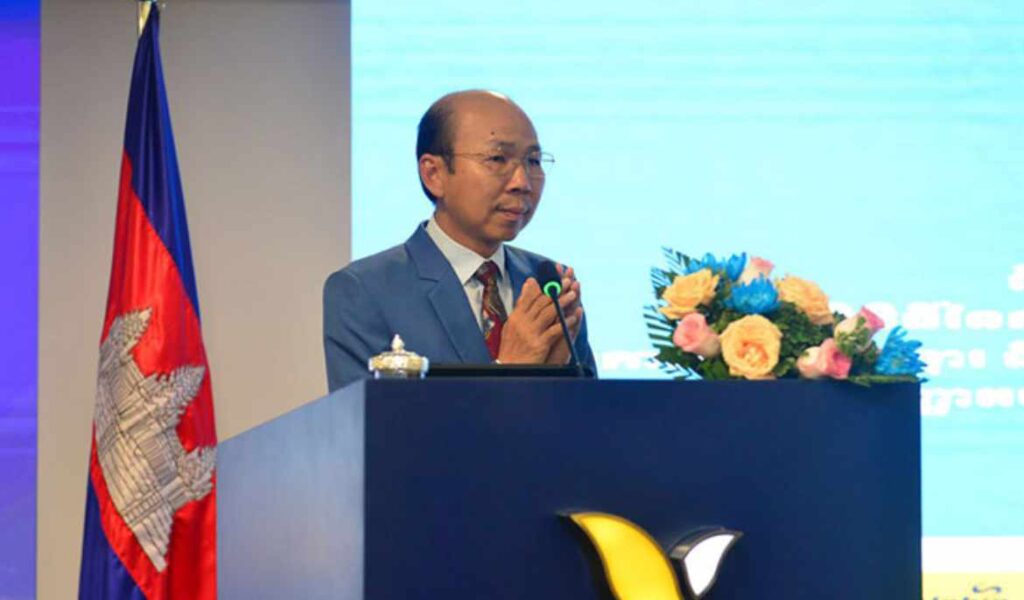A Certificate of Origin (C/O) is more than just a document; it is a passport that opens the door for Cambodian products to gain credibility and a competitive edge in international markets, according to Ly Khun Thai, President of the Cambodia Confederation of Investors Association (CCIA) and Chairman of the Cambodia Footwear Association (CFA).
Speaking at a workshop on the procedures for applying for a C/O and the Rules of Origin in Phnom Penh on Wednesday, Khun Thai underscored the vital role of C/Os in facilitating trade and advancing Cambodia’s export-driven growth.
The event was attended by Lim Tong, Chairman of the Cambodia Travel Goods and Leather Association (CTLA), Sy Batith, Deputy Director of Export-Import at the Ministry of Commerce, members of the association, and other distinguished guests.
“Under the prudent leadership of the Royal Government, Cambodia continues to pursue a robust economic agenda focused on diversification, increasing competitiveness, and fostering an attractive business environment,” Khun Thai stated.
“The C/O is not just a document; it’s a key to obtaining market preferences and a testament to the origin and authenticity of our goods.”
The workshop aimed to demystify the complexities surrounding the Rules of Origin, which are the criteria used to determine the national origin of a product.
These rules are pivotal in deciding whether a product qualifies for tariff preferences under Free Trade Agreements (FTAs) or the Generalised System of Preferences (GSP). A clear understanding of these rules is essential for Cambodian businesses to fully leverage the benefits of various trade agreements.
Khun Thai highlighted that without a thorough grasp of these rules and the procedures for applying for a C/O, Cambodian businesses risk missing out on valuable opportunities that could spur growth and contribute to the national economy.
He emphasised the importance of such knowledge in the context of Cambodia’s active participation in regional and bilateral trade frameworks, including the Regional Comprehensive Economic Partnership (RCEP), the ASEAN Free Trade Area, and several bilateral agreements with key trading partners.
The workshop was designed to be an interactive and collaborative learning environment, bringing together speakers and experts with deep knowledge in the field. Participants, including business representatives, government agencies, and academic institutions, were encouraged to actively engage in discussions, ask questions, and share their perspectives and challenges.
The agenda covered key aspects such as the fundamental principles of rules of origin, specific rules under relevant trade agreements, and detailed procedures for applying for a certificate of origin. Practical steps involved in ensuring a smooth and compliant application were discussed, including tips to avoid common mistakes.
The knowledge and skills imparted during the workshop are expected to benefit individual organizations and contribute significantly to building a stronger Cambodian trade facilitation ecosystem.
By empowering businesses to access international markets with confidence and ensuring compliance with global trade regulations, the initiative aims to increase the resilience and competitiveness of Cambodia’s economy.
Khun Thai reiterated that effective trade facilitation is a shared responsibility requiring close collaboration between government institutions, the private sector, and all stakeholders involved in the trade process.
Insights gained from the workshop are anticipated to help identify areas for improvement, streamline existing procedures, and foster a more conducive environment for trade and investment in Cambodia.
In a significant presentation during the workshop, Sy Batith, Deputy Director of Export-Import at the Ministry of Commerce, outlined new measures aimed at preventing and suppressing counterfeit goods origin, while ensuring proper procedures for issuing certificates of origin for Cambodian exports to the United States.
“The objective is to prevent counterfeit goods origin and strengthen existing regulations by enhancing monitoring mechanisms to verify the use of domestic raw materials and components, in line with the Rules of Origin and US requirements,” Batith said.
The new Prakas applies to producers and exporters shipping certain Cambodian-origin goods to the US, as listed in Appendix 1 of Prakas No. 047 dated April 30, 2025.
The General Department of Customs and Excise under the Ministry of Economy and Finance and the General Department of Commercial Services under the Ministry of Commerce will collaborate to exchange information and documentation relevant to producers and importers.
This cooperation aims to ensure compliance with the Rules of Origin, as outlined in the Standard Operating Procedures for issuing certificates of origin.
Data exchange mechanisms between the two agencies will be determined by an inter-ministerial decision.
In cases where the origin of goods is questioned by the US or other authorities, both departments will coordinate investigations and may request support from relevant institutions.
Batith warned that any producer or exporter found misrepresenting the origin of goods or engaging in illegal transport activities will face sanctions as stipulated in the relevant Rules of Origin and Customs regulations.
The workshop served as a crucial platform for enhancing the understanding of Certificates of Origin and Rules of Origin among Cambodian exporters.
By equipping stakeholders with the necessary knowledge and tools, the initiative aims to facilitate smoother international trade operations, ensure compliance with global standards, and ultimately contribute to the growth and prosperity of Cambodia’s export sector.



